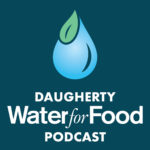 Roric Paulman is a producer and owner of Paulman Farms, located just south of Sutherland, Nebraska and in the heart of the Ogallala Aquifer, comprised of both irrigated and rain fed farmland. The farm was established and harvested its first crop in 1985 and uses the latest on-farm technology to grow more than a dozen crops. It is one of two “smart farms” in Nebraska that DWFI and the Nebraska Water Center helped the University of Nebraska–Lincoln establish to test the real-world ability of innovations to increase yields and improve sustainability outside of a controlled environment. It is equipped with high-speed wireless internet for data access, cutting-edge sensors and precision application equipment that helps to improve water, nitrogen and other input efficiencies, as well as soil health, carbon sequestration and technology development.
Roric Paulman is a producer and owner of Paulman Farms, located just south of Sutherland, Nebraska and in the heart of the Ogallala Aquifer, comprised of both irrigated and rain fed farmland. The farm was established and harvested its first crop in 1985 and uses the latest on-farm technology to grow more than a dozen crops. It is one of two “smart farms” in Nebraska that DWFI and the Nebraska Water Center helped the University of Nebraska–Lincoln establish to test the real-world ability of innovations to increase yields and improve sustainability outside of a controlled environment. It is equipped with high-speed wireless internet for data access, cutting-edge sensors and precision application equipment that helps to improve water, nitrogen and other input efficiencies, as well as soil health, carbon sequestration and technology development.
Roric is an avid user of new technologies and practices he believes will help make his operation more sustainable while still increasing profits. He is also a member of the DWFI international advisory board and Board Chair of the Nebraska Water Balance Alliance, an organization that catalyzes best practices among Nebraska farmers by emphasizing practical, locally focused watershed management practices. Roric is active on state, regional, and national boards for many of the crops he grows and is focused on helping to promote farmer understanding of best practices in water use efficiency.
In this episode of our special series focused on water and agriculture in Nebraska, Frances Hayes, DWFI director of communications and public relations, chats with Roric about why technology’s intersection with agriculture is so top of mind and how he sees growers working together to protect groundwater and surface water.
Listen here or subscribe on your favorite podcast platform:
DWFI Podcast 15 - Roric Paulman, Paulman Farms 26:59
The Robert B. Daugherty Water for Food Global Institute (DWFI) at the University of Nebraska was founded with the mission to have a lasting and significant impact on achieving more food security with less pressure on scarce water resources by conducting scientific and policy research, using the research results to inform policy makers, and sharing knowledge through education and communication.
How to subscribe:
